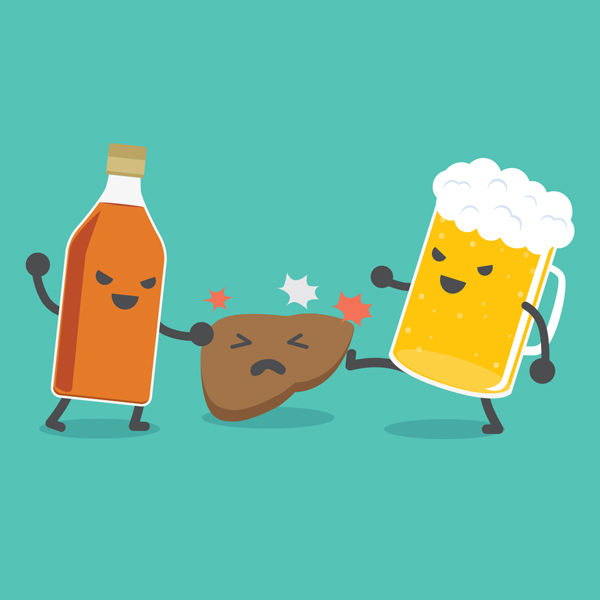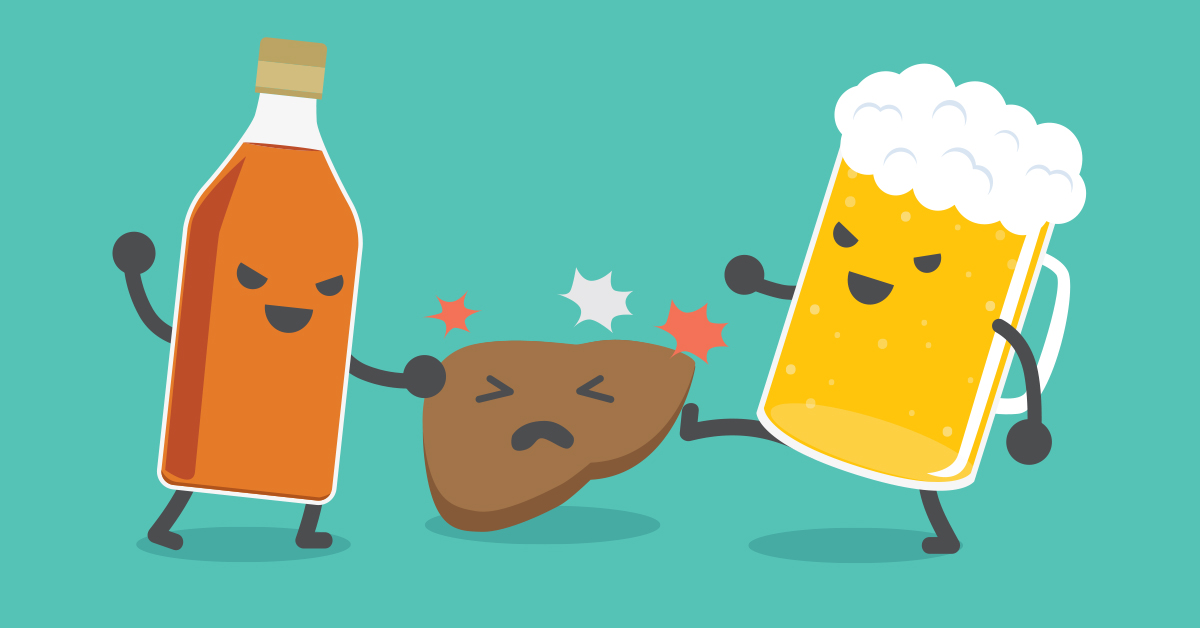ARTICLES, DRUG ABUSE & EFFECTS OF ALCOHOL. REHABILITATION, HEALTHY LIVING & WELL BEING. EATING DISORDERS
Alcohol and your liver: 5 Things You Need to Know!


You may have heard people say that their “liver hurts” after a night of heavy drinking, but most of them likely don’t have a severe disease. In fact, as per Dr. Tim Pawlik (an expert on liver cancer at Johns Hopkins) “anywhere from 8% to 20% of chronic alcoholics will end up developing cirrhosis.”
We still don’t fully understand why only a portion of moderate to heavy drinkers develop cirrhosis of the liver. What we do understand is this: If you continue to drink, your chances go WAY up.
Risk Factors
Did you know that there are three stages of alcoholic liver disease?
- Fatty Liver
- Alcoholic Hepatitis (Inflammation of the liver)
- Cirrhosis (Fibrosis, or scarring, of the liver)
Dr. Pam Peeke, an author of “The Hunger Fix: The Three-Stage Detox and Recovery Plan for Overeating and Food Addiction” and senior science advisor to Elements Behavioral Health, states that fatty liver and alcoholic hepatitis are relatively common in alcoholics. “One in five people who are alcoholics develop [alcoholic] hepatitis, and one in four develop cirrhosis,” Says Peeke. “You’ll be at higher risk if you also have fatty liver—it’s those people who tend to be at higher risk for cirrhosis if they continue to drink.”
- Fatty Liver will develop in about 90% of heavy drinkers.
- Alcoholic Hepatitis will occur in 10-35% of heavy drinkers and Cirrhosis in about 10-20%.
Peeke says that some elements of cirrhosis are reversible but, “there has to be 100% abstinence in order to be able to achieve that…”
1.Amount of Alcohol
It usually takes years of heavy drinking to develop an alcoholic liver disease – and the longer you drink the higher your chances are. However, not all alcoholics develop a disease. Studies show, that people who drink constantly are at a higher risk than those who drink irregularly through the week or perhaps just drink too much on weekends.
2.Gender
Women are far more likely to develop an alcoholic liver disease than men. This is due in part to the proportion of body fat women have, and their changes in fat absorption because of their menstrual cycle. They also secrete less alcohol dehydrogenase than men, which helps break down alcohol. For these reasons, women are far more likely to develop a liver disease faster and more severely than their male counterparts.
3.Immune System
If an alcoholic has a compromised immune system already, their risk of developing a liver disease increases. Research currently shows that an individual with Hepatitis C and/or HIV have an increased risk of liver disease. These diseases cause liver cell death, and the consumption of alcohol possibly speeds up the process. However, any condition that makes it harder for your body to maintain good health will increase your risk of liver disease – including diabetes or obesity.
4.Genetics
“We’ve just now begun to understand the role of genetics, which is very strong,” States Peeke. There are gene mutations that predispose a person to alcoholism and developing a liver disease. These mutations affect an individual’s metabolism of alcohol. Mutations in genes such as ADH (alcohol dehydrogenase), ALDH (aldehyde dehydrogenase), and CYP4502E1 (one of the many cytochrome P450 enzymes) may partly a person’s susceptibility to liver disease.
5.Nutrition
One of the many problems that alcoholics face is poor nutrition. Research is being conducted on how alcohol affects the gut bacteria, and how it can lead to problems digesting food and absorbing nutrients. The poor diet of an alcoholic can lead to malnutrition, and exacerbate it. Malnutrition increases oxidative stress, which boosts liver disease by depleting circulating antioxidants. The altered fat metabolism causes an increase in the production of triglycerides that get deposited in the liver. This contributes to fatty liver. An alcoholic suffering from malnutrition is also at a higher risk of infection because of a suppressed immune system caused by their altered protein status.
One of the worst things you can consume as a recovering alcoholic – aside from alcohol – is refined carbs and other junk food. It undermines the progress you’ve made towards recovery. These simple sugars and processed foods can cause mood swings, and increase your risk of relapse. So when AA offers you a cookie, or someone bakes you a cake for your “soberversary”, resist if you can! This improper nutrition can impede your recovery in another way. Sugar addiction is real. By replacing alcohol with sugar, you are essentially switching one substance abuse for another. If you continue to put trash into your body, your recovery and health will never be optimised.
So, take care of your body!
- Engage in regular exercise
- Eat your vegetables
- Stay away from refined or processed foods
Even if you aren’t an alcoholic, be aware of the amount of alcohol you are consuming. Constant exposure of your liver to alcohol increases your chances of disease, so maybe rethink that second glass of wine tonight?







